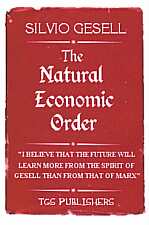
Natural Economic Order

Description
TGS Historical Reprint Series
by Silvio Gesell
Excerpt from Preface: About The Natural Economic Order:
About The Natural Economic Order:
Gesell's celebrated work on monetary and social reform is a modern attempt to provide a solid basis for economic liberalism, the creed of Adam Smith and almost all the great nineteenth century economists in contrast to the twentieth century trend of collectivism and planned economy - accompanied by 'austerity', 'import restriction', 'dollar shortage', 'pegging the exchanges' and 'credit squeeze'. There is now again trend toward economic liberalism: private initiative, free trade and free exchanges. Economic liberalism, believed to have been strongly influenced by Gesell's book, has produced the "West German miracle", the quickest and by far most complete recovery of any country that had been under the bombs.
The book gives the economist, the politician and the businessman clear insight into the mechanism and dangers of inflation and deflation and contains an authorative account of unhoardable money, money that causes its holder carrying costs - a completely original idea important in monetary theory and practice.
The economic order here discussed is a natural order only in the sense that it is adapted to the nature of man. It is not an order which arises spontaneously as a natural product. Such an order does not, indeed, exist, for the order which we impose upon ourselves is always an act, an act consciously willed.
The proof that an economic order is suited to the nature of man is furnished by observation of mankind's development. The economic order under which men thrive is the most natural economic order. Whether an economic order which stands this test is at the same time technically the most efficient order, whether it provides the bureau of trade statistics with record figures is a matter of secondary importance. At the present day it is easy to imagine an economic system of high technical efficiency coupled with gradual exhaustion of the human material. It may, however, be taken for granted that an economic order under which mankind thrives will also prove its technical superiority. For human work can, ultimately, only advance with the advance of the human race. "Man is the measure of all things" including the economic system under which he lives.
The prosperity of mankind, as of all living beings, depends in the main upon whether selection takes place under natural laws. But these laws demand competition. Only through competition, chiefly competition in the economic sphere, is right evolution, eugenesis, possible. Those who wish to ensure the full miraculous effects of the laws of natural selection must base their economic order upon competition under the conditions really decreed by nature, that is, with the weapons furnished by nature after the exclusion of all privileges. Success in competition must be exclusively determined by inborn characteristics, for only so are the causes of the success transmitted to the offspring and added to the common characteristics of mankind. Children must owe their success, not to money, not to paper privileges, but to the ability, strength, love and wisdom of their parents. Only then shall we be justified in hoping that humanity may in time shake off the burden of inferior individuals imposed upon it by thousands of years of unnatural selection - selection vitiated by money and privileges. And we may also hope that in this way supremacy may pass from the hands of the privileged, and that mankind, led by the noblest sons of men, may resume its long-interrupted ascent towards divine aims.
But the economic order which we are about to discuss has another claim to the title of a natural order.
Human beings, to prosper, must be able under all circumstances to give themselves out for what they are. A man must be something, not appear something; he must be able to stride through life with head erect-to speak the truth without incurring the risk Of hardship or injury. Sincerity must not remain the privilege of heroes. The economic order must be so framed that a man may combine sincerity with the highest degree of economic success. The dependence inseparable from economic life should affect things only, not men.
If a man is to be free to act as his nature dictates, religion, custom and law must extend him their protection when, in his economic life, he is guided by justified egoism-when he obeys the impulse of self- preservation given him by nature. If a malls actions conflict with religious opinions, and if the man, nevertheless, is morally thriving, the religious opinions should be examined afresh on the presumption that a tree cannot be evil which bears good fruit. We must avoid the fate of a Christian reduced to beggary and disarmed in the economic trial of strength by the logical application of his creed-with the result that he and his brood go under in the process of natural selection. Humanity gains nothing if the finest individuals it produces are crucified. Eugenic selection requires the direct contrary. The best of mankind must be allowed to develop, for only then can we hope that the inexhaustible treasures latent in man will gradually be brought to light.
Historical Reprint - From 1918 Edition
Softbound, 5x8, 450+ pages















